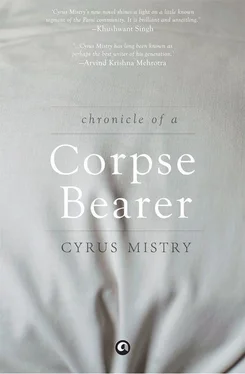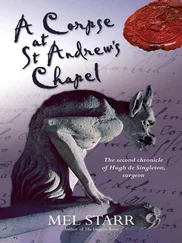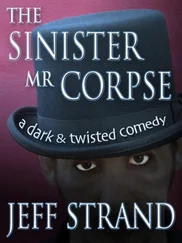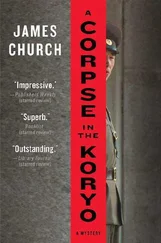‘Why do you think there are so many strange, new, incurable diseases in the world? Why do people no longer live to be a hundred, or a hundred and fifty, or two hundred years old as they used to in the olden days? Why do you think evil has been able to tighten its stranglehold on humankind?’ Framroze would rage, if he ever he saw Vispy or me slip up in our routines.
‘It’s because people have forgotten the conjunction between hygiene and spirituality,’ he would continue, answering his own question. ‘Or because they presume it is inconsequential. No wonder the world has become such a bedevilled place!’
Nevertheless, of all my family members, it was my father I was closest to. His capacity for softness and indulgence towards me seemed limitless. There were times, I remember, during my fits of endless giggling — even while scolding me to stop being an ass — I could discern in his eyes and in the lines on his face, despite the thick camouflage of a riotous salt-and-pepper beard, the disallowed flicker of an impulse of love, the suppressed urge to join in my infectious giggling. Or did I imagine it?
In fact, until the time he completely disowned me, and never wanted to see my face again, my father was the only one in the family who refused to believe there was anything deficient with my intelligence. Unlike Mother, whose love for me was fraught with unspoken fears that she had perhaps given birth to a completely obtuse and moronic second child, I felt deep down that Father was actually proud of me; that, secretly, he continued to nurture hopes that once I had run through my juvenile frivolities, and stopped playing the fool, I would emerge a brilliant religious scholar, if not a respected high priest like himself.

My performance at school, however, was disappointingly below par, and far below the record established by my brother before me. Having cleared his matriculation exam with an impressively high score, Vispy was the recipient of a scholarship from a Parsi charitable fund for boys from underprivileged families. Already, he had joined a commercial institute where he was learning typing and shorthand, as well as bookkeeping and accountancy. Now that he had grown up, he travelled to the institute and back on the city’s public transport buses and trams, sometimes returning late in the evening only just in time for dinner. I envied Vispy his new-found freedom, but was constantly reminded by my parents that he had earned it.
‘Dunce!’
‘Donkey!’
‘Dullard!’
Some of the elderly teachers at school, I couldn’t help notice, reserved their angriest invective for me. On the verge of retirement themselves, they made it a point to recall the years they had spent giving instruction to my brother with exaggerated nostalgia and yearning. My own family members thought it, frankly, improper and nonsensical to even draw such comparisons between us.
The truth was I had no real interest in school, or in enforced learning. Nevertheless, goaded and punished, threatened and yelled at, often the butt of the practical jokes of my classmates— I suspect they saw me as a simpleton, too, but I didn’t mind — I stumbled slowly up the ladder through high school; but, alas, I failed to clear my final matriculation exam.
Father was disappointed. On a number of occasions during the last two years, he had been urging me to study hard, and see if I could possibly even improve on Vispy’s score. He was hoping that a healthy spirit of competition between the brothers might serve to uncover the depths of dormant potential in me. When he heard I had failed, he was as supportive as he could bear to be.
‘Start studying right away for the second attempt!’ he said to me sternly.
All those who failed were given a second chance by the Board to reappear for the exam in eight months’ time.
‘This time make sure that you not only pass, but do so with flying colours! Of course, I will do what I can, to help. .’
He muttered that last line sotto voce, as if reminding himself of something he had undertaken to do. I understood that he was making me a promise. Father had a great belief in the miraculous power of our ancient liturgy. In that respect, he was a worthy successor to his mentor, the great Dastoorji Eruchsah Kookadaroo. In the latter’s small bedroom, now occupied by my father (my mother, Vispy and I shared the other larger room, so as not to disturb Father during his odd hours of sleep), the venerable Eruchsah had preserved, in a wooden cabinet, some arcane handwritten manuscripts in the forgotten Avestan language.
Before he passed on, he had bequeathed this rare heritage to my father. The pages of these manuscripts were so old that they practically crumbled on touch; the writing on them faded, but nevertheless legible. One afternoon, while mother was getting our dinner ready in the kitchen, I discovered Father alone with a roll of brown-gum tape repairing one of these long, loose-sheaved notebooks whose parchment-like pages were coming apart. Abstractedly, as though speaking only to himself, he said:
‘Hidden in these sacraments are vibrations so powerful that when recited aloud, they can make the impossible come true: the mortally ill healthy again, the impoverished discover untold wealth and the foolish find it in them to utter words that command respect from the wise! Only, strong faith is demanded in their recitation; the kind of faith that can manifest a towering blaze on sodden earth.’
I understood that Father, busy as he was, intended to unleash the power of these ancient formulae to help me pass my matriculation exam. I was touched, and promised myself I would reciprocate his faith in me by doing my very best.

Despite my staunchest resolve, I found myself unequal to the task of competing with Vispy; indeed, of applying myself to any form of concerted study.
Every time I tried to focus on reading, or cramming, I encountered an immense rock-like barrier in my head which made me wonder if I wasn’t really the dunce and fathead my family had always made me out to be. On the other hand, it was also true that left to my own resources I was pretty certain this was no infirmity — a weakness of sorts, perhaps — but what I really craved was something more robust than books. To find myself out-of-doors, unconfined by Father’s fire temple with its holy smoke, salutary fragrances and workaday miracles: to be adult, free to go out and earn money, make my way in the world. .
By the time I was in my teens, I intensely hated the feeling of being hemmed in by the norms of temple living, of being controlled in the myriad subtle ways a family employs to augment dependence and prolong childhood. But I knew that so long as I continued to live with my parents, nothing would change, my day-to-day routine remaining as invariable as the hoarsely stentorian chanting of the priests through the morning in the prayer hall, in a language that nobody had spoken or understood for the last three thousand years.
The real disappointment, though, that irked my father was not so much my dismal performance at school as the fact that though I was already sixteen I was not even a naavar yet. This is the first test one negotiates on the road to full-fledged priesthood— being ordained a novitiate priest. Not that my father wanted either of his sons to become full-time priests like himself: he knew only too well how low his profession had slumped in our burgeoning city of commerce. There was no money in it and not much respect either. Nevertheless, in those days, every family of the priestly caste deemed it necessary and appropriate for their sons to go through at least this first stage of ritual training and initiation.
Читать дальше













